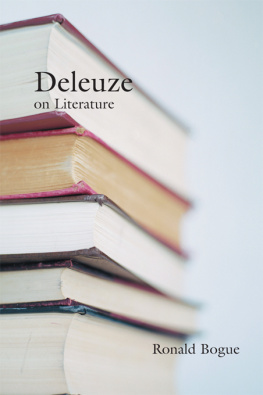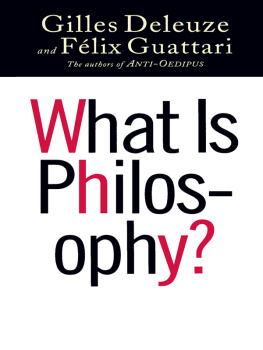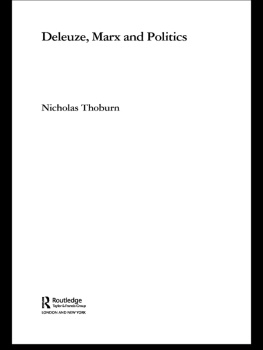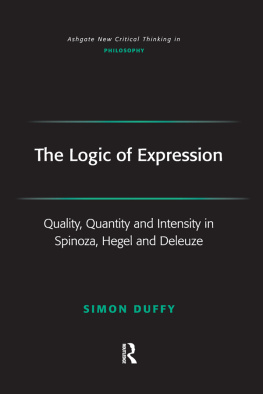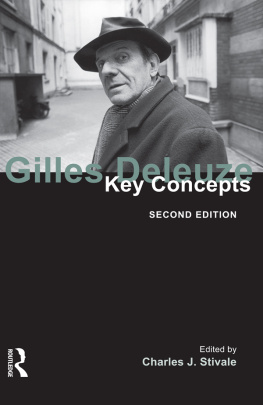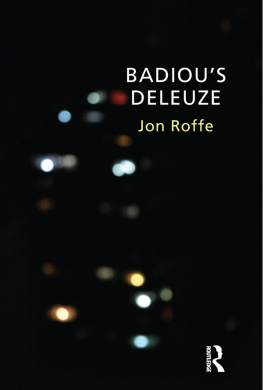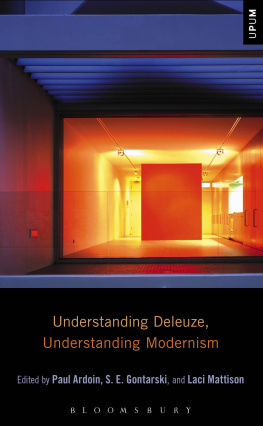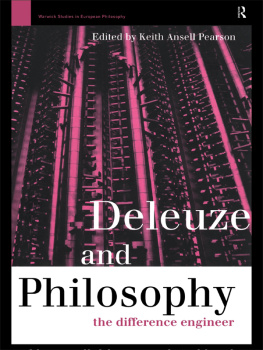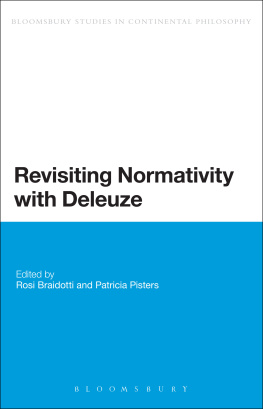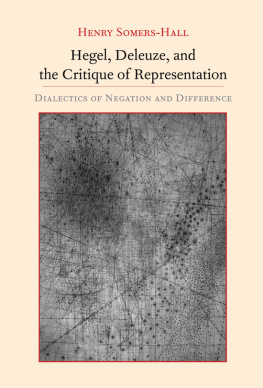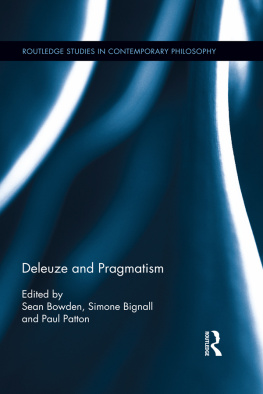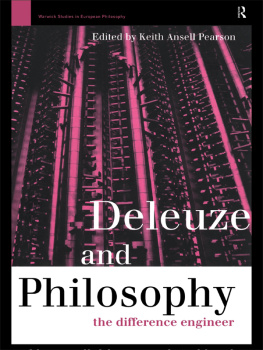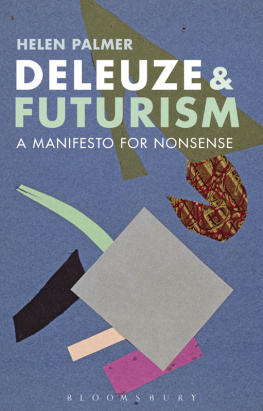
Deleuze on Literature
Deleuze on Literature
RONALD BOGUE

Published in 2003 by
Routledge
711 Third Avenue
New York, NY 10017
routledge-ny.com
Published in Great Britain by
Routledge
2 Park Square, Milton Park,
Abingdon, Oxon, OX14 4RN
routledge.co.uk
Copyright 2003 by Taylor & Francis Books, Inc.
Routledge is an imprint of the Taylor & Francis Group.
All rights reserved. No part of this book may be reprinted or reproduced or utilized in any form or by any electronic, mechanical, or other means, now known or hereafter invented, including photocopying and recording, or in any information storage or retrieval system without permission in writing from the publisher.
10 9 8 7 6 5 4 3 2 1
Cataloging-in-Publication Data is available from the Library of Congress
ISBN 0415966051 (hb)
ISBN 041596606X (pb)
For my wife, Svea
Contents
Coda: Becketts Television Plays
Abbreviations
All translations from Deleuze, Guattari and Deleuze-Guattari are my own. For works that have appeared in English translation, citations include page numbers of the original French edition followed by the page numbers of the corresponding passages in the English translation.
| AO | Deleuze and Guattari. LAnti-Oedipe: Capitalisme et schizophrnie I. Paris: Minuit, 1972. Anti-Oedipus. Trans. Robert Hurley, Mark Seem and Helen R. Lane. Minneapolis: University of Minnesota Press, 1977. |
| B | Deleuze. Le Bergsonisme. Paris: Presses Universitaires de France, 1966. Bergsonism. Trans. Hugh Tomlinson and Barbara Habberjam. New York: Zone Books, 1991. |
| CC | Deleuze. Critique et clinique. Paris: Minuit, 1993. Essays Critical and Clinical. Trans. Daniel W. Smith and Michael A. Greco. Minneapolis: University of Minnesota Press, 1997. |
| D | Deleuze and Claire Parnet. Dialogues. Paris: Flammarion, 1977. Dialogues. Trans. Hugh Tomlinson and Barbara Habberjam. New York: Columbia University Press, 1987. |
| DR | Diffrence et rptition. Paris: Presses Universitaires de France, 1968. Difference and Repetition. Trans. Paul Patton. New York: Columbia University Press, 1994. |
| E | Deleuze. Lpuis (published with Samuel Becketts Quad). Paris: Minuit, 1992. The Exhausted, Trans. Anthony Uhlmann in Essays Critical and Clinical. Trans. Daniel W. Smith and Michael A. Greco. Minneapolis: University of Minnesota Press, 1997, pp. 15274. |
| F | Deleuze. Foucault. Paris: Minuit, 1986. Foucault. Trans. Sen Hand. Minneapolis: University of Minnesota Press, 1988. |
| FB | Deleuze. Francis Bacon: Logique de la sensation. Vol 1. Paris: Editions de la diffrence, 1981. |
| K | Deleuze and Guattari. Kafka: Pour une littrature mineure. Paris: Minuit, 1975. Kafka: Toward a Minor Literature. Trans. Dana Polan. Minneapolis: University of Minnesota Press, 1986. |
| LS | Deleuze. Logique du sens. Paris: Minuit, 1969. The Logic of Sense. Trans. Mark Lester, with Charles Stivale. Ed. Constantin V. Boundas. New York: Columbia University Press, 1990. |
| MM | Deleuze. Mystique et masochisme. La quinzaine littraire 25 (April 1-15, 1967): 12-13. |
| MP | Deleuze and Guattari. Mille plateaux: Capitalisme et schizophrnie, II. Paris: Minuit, 1980. A Thousand Plateaus. Trans. Brian Massumi. Minneapolis: University of Minnesota Press, 1987. |
| N | Deleuze. Nietzsche. Paris: Presses Universitaires de France, 1965. |
| NP | Deleuze. Nietzsche et la philosophie. Paris: Presses Universitaires de France, 1962. Nietzsche and Philosophy. Trans. Hugh Tomlinson. Minneapolis: University of Minnesota Press, 1983. |
| PO | Deleuze and Guattari, Politique et psychanalyse. Alenon: des mots perdus, 1977. |
| PP | Deleuze. Pourparlers. Paris: Minuit, 1990. Negotiations. Trans. Martin Joughin. New York: Columbia University Press, 1995. |
| PS | Deleuze. Proust et les signes. 3rd edition. Paris: Presses Universitaires de France, 1976. Proust and Signs. Trans. Richard Howard. New York: G. Braziller, 1972. |
| QP | Deleuze and Guattari. Quest-ce que la philosophie? Paris: Minuit, 1991. What Is Philosophy? Trans. Hugh Tomlinson and Graham Burchell. New York: Columbia University Press, 1994. |
| S | Deleuze. Spinoza: Philosophie pratique. 2nd edition. Paris: Minuit, 1981. Spinoza: Practical Philosophy. Trans. Robert Hurley. San Francisco: City Lights, 1988. |
| SM | Deleuze. Prsentation de Sacher-Masoch: le froid et le cruel. Paris: Minuit, 1967. Masochism: An Interpretation of Coldness and Cruelty. Trans. Jean McNeil. New York: G. Braziller, 1971. |
| SP | Deleuze and Carmelo Bene. Superpositions. Paris: Minuit, 1979. One Less Manifesto, trans. Alan Orenstein. In The Deleuze Reader. Ed. Constantin V. Boundas. New York: Columbia University Press, 1993, pp. 20422. |
Introduction
At the time of his death on November 4, 1995, Gilles Deleuze was recognized widely as one of the most important figures in late-twentieth-century French philosophy. Throughout his career, Deleuze showed an abiding interest in several of the arts, but perhaps in none more consistently than literature. Besides writing books on Proust (1964, revised and expanded in 1970 and 1976), the nineteenth-century novelist Leopold Sacher-Masoch, for whom masochism was named (1967), and Kafka (1975), as well as a final collection of essays on literature, titled Essays Critical and Clinical [CC] (1993), Deleuze made constant reference to novels, poems, plays and essays in virtually all of his works. Among the philosophers he most valued was Nietzsche, whom many would characterize as a decidedly literary figure, and other writer-philosophers and philosopher-writers made frequent appearance in his booksKierkegaard, Blanchot, Michaux, Artaud, Klossowski, Beckett, Mallarm, and Borges, among others. Deleuzes 1969 examination of the paradoxes of meaning, The Logic of Sense (LS), was as much a reading of Lewis Carroll as a treatment of Stoic philosophy, and scattered throughout the pages of the massive A Thousand Plateaus (MP) (1980) were references to over seventy-five writers.
Yet despite the ubiquity of literary concerns and citations in his works, nowhere does Deleuze directly offer a systematic theory of literature, nor is one easily extrapolated from his various literary studies. Much of Deleuzes writing on literature is a thinking-alongside literary works, an engagement of philosophical issues generated from and developed through encounters with literary texts. Hence, to a certain extent his thought about literature cannot be fully appreciated apart from a consideration of the works that instigate it. He engages a host of issues related to language, meaning, writing and literature, but in such different contexts and toward such diverse ends that it is sometimes difficult to see how one analysis might be related to another. Nonetheless, a single line of conceptual development traverses all of Deleuzes writings on literature, one generated by the driving concerns of his philosophy. He is no systematic philosopher, in the traditional sense of the term, but there is cohesion in his thought and a wideranging interrelation of motifs across the various disciplines and domains of his speculation. My effort in this book is to examine Deleuzes central texts on literature, language and writing, determine his understanding of the nature and function of the literary within the general domain of social practices and suggest the broad trajectory of his thought that passes through his diverse engagements with literary works over the course of his career.
Next page
